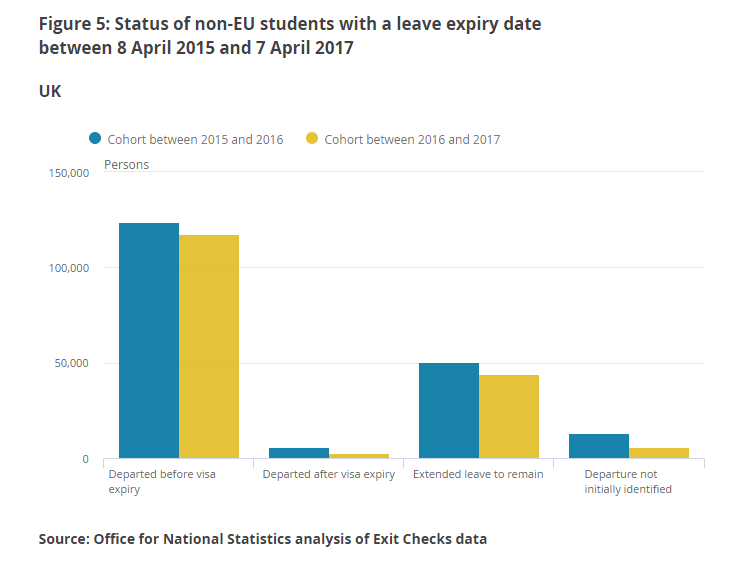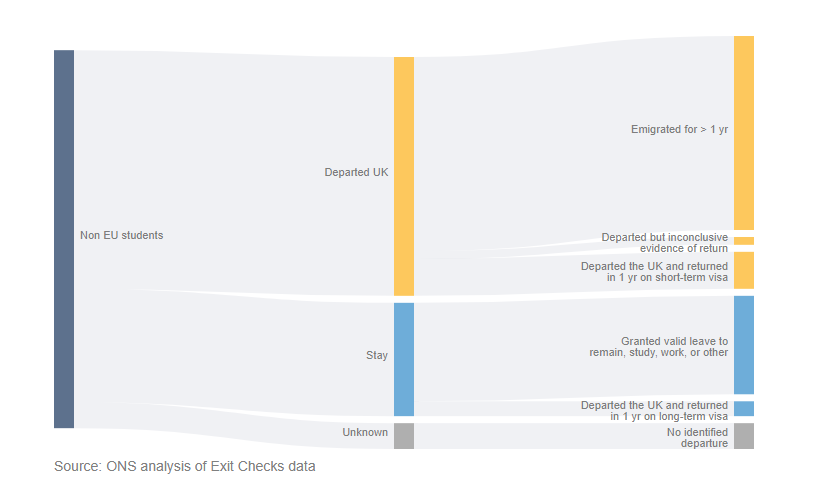There is “no evidence” of a major problem with overseas students who study in the UK overstaying their visas, according to the country’s official statistics body.
A key report that cast severe doubts over previous claims that tens of thousands of international students were overstaying says that students from outside the European Union “are to a very large extent compliant with their visas in terms of departing or staying legally via extensions of leave”.
The study, from the Office for National Statistics, uses a new analysis of border checks on departing students to find that, of those whose long-term study visa expired in 2016-17, 95 per cent either left the UK or remained legally by gaining a visa extension for further study or work.

Separate statistics from the Home Office on exit checks, including for those on short-term study visas, show that of students whose visa expired in 2016-17, 97.4 per cent were recorded as “having left in-time” leaving 4,617 who may have overstayed or where there was no data for another reason. For those on long-term (Tier 4) study visas, 97 per cent, left in-time leaving 3,340 people unaccounted for.
Publication of the new data was prompted by a highly critical report published in July by the Office for Statistics Regulation (OSR) that warned estimates of long-term student immigration to the UK needed a health warning due to the high potential for errors.
This was because they were being based on responses to the International Passenger Survey (IPS), which questions a sample of people entering and leaving the UK.
The IPS estimates have consistently suggested that far fewer overseas students - numbering the tens of thousands - were leaving the UK than arriving, leading to government ministers, including Prime Minister Theresa May in her previous role as home secretary, to attack the education sector as a source of illegal immigration.
In a foreword to today’s ONS report, Iain Bell, deputy national statistician for population and public policy, says that the work of statisticians across government had found there was “no evidence of a major issue of non-EU students overstaying their entitlement to stay”.
He said that the review of the IPS data and actual exit checks cast serious doubt over relying on IPS responses to estimate long-term migration for study because students often changed their minds on their next steps.
Mr Bell said the new statistical work had shown that “many people do not simply immigrate for study and leave afterwards; their lives are more complex – some people arrive on a work visa and legitimately change to a study visa and vice versa”.
He added: “Our analysis confirms that a lower number of departing students return to the UK within 12 months compared to the number who reported such an intention when departing the UK.”
What non-EU students whose study visa expired between 2015 and 2016 did next

Mr Bell said statisticians across government would now work towards creating “a robust approach to measuring net migration” by category but said “in the meantime we should no longer publish breakdowns of net migration by reason as these do not reflect the complexities of people’s lives”.
Alistair Jarvis, chief executive of Universities UK, said the ONS and Home Office reports showed “that there is very high visa compliance by international students. The number of students overstaying their visas is a tiny fraction of previous (incorrect) claims.”
He added UUK was “ready to assist” the ONS and the Home Office in developing better measures of student migration but stressed that “any future decisions on international student visa policy must not be based on the International Passenger Survey data”.
Today’s reports were published alongside the latest estimates on long-term immigration for study, that showed there was “a statistically significant decrease of 27,000” in numbers in the year to March 2017 compared with the previous 12 months. Separate Home Office statistics showed sponsored visa applications to study at UK universities went up 5 per cent over the 12 months to the end of June.
The government has also announced that it is commissioning the Migration Advisory Committee to carry out a “detailed assessment of the social and economic impact of international students” in the UK.
Find out more about THE DataPoints
THE DataPoints is designed with the forward-looking and growth-minded institution in view
Register to continue
Why register?
- Registration is free and only takes a moment
- Once registered, you can read 3 articles a month
- Sign up for our newsletter
Subscribe
Or subscribe for unlimited access to:
- Unlimited access to news, views, insights & reviews
- Digital editions
- Digital access to THE’s university and college rankings analysis
Already registered or a current subscriber?





